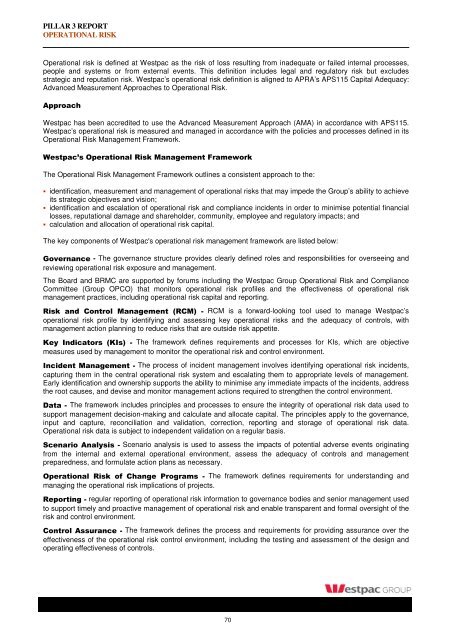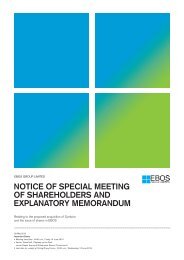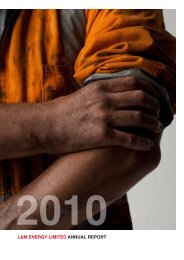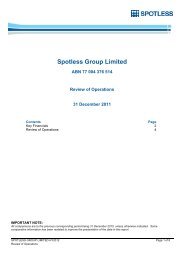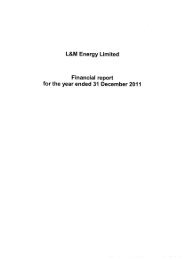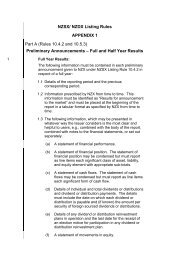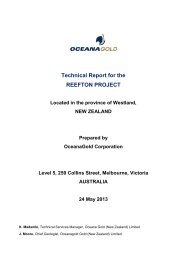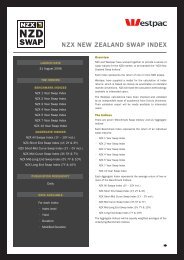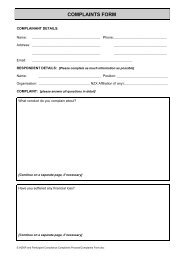Westpac Group Pillar 3 Report March 2013 - Iguana IR Sites
Westpac Group Pillar 3 Report March 2013 - Iguana IR Sites
Westpac Group Pillar 3 Report March 2013 - Iguana IR Sites
Create successful ePaper yourself
Turn your PDF publications into a flip-book with our unique Google optimized e-Paper software.
PILLAR 3 REPORT<br />
OPERATIONAL RISK<br />
Operational risk is defined at <strong>Westpac</strong> as the risk of loss resulting from inadequate or failed internal processes,<br />
people and systems or from external events. This definition includes legal and regulatory risk but excludes<br />
strategic and reputation risk. <strong>Westpac</strong>’s operational risk definition is aligned to APRA’s APS115 Capital Adequacy:<br />
Advanced Measurement Approaches to Operational Risk.<br />
Approach<br />
<strong>Westpac</strong> has been accredited to use the Advanced Measurement Approach (AMA) in accordance with APS115.<br />
<strong>Westpac</strong>’s operational risk is measured and managed in accordance with the policies and processes defined in its<br />
Operational Risk Management Framework.<br />
<strong>Westpac</strong>’s Operational Risk Management Framework<br />
The Operational Risk Management Framework outlines a consistent approach to the:<br />
identification, measurement and management of operational risks that may impede the <strong>Group</strong>’s ability to achieve<br />
its strategic objectives and vision;<br />
identification and escalation of operational risk and compliance incidents in order to minimise potential financial<br />
losses, reputational damage and shareholder, community, employee and regulatory impacts; and<br />
calculation and allocation of operational risk capital.<br />
The key components of <strong>Westpac</strong>'s operational risk management framework are listed below:<br />
Governance - The governance structure provides clearly defined roles and responsibilities for overseeing and<br />
reviewing operational risk exposure and management.<br />
The Board and BRMC are supported by forums including the <strong>Westpac</strong> <strong>Group</strong> Operational Risk and Compliance<br />
Committee (<strong>Group</strong> OPCO) that monitors operational risk profiles and the effectiveness of operational risk<br />
management practices, including operational risk capital and reporting.<br />
Risk and Control Management (RCM) - RCM is a forward-looking tool used to manage <strong>Westpac</strong>’s<br />
operational risk profile by identifying and assessing key operational risks and the adequacy of controls, with<br />
management action planning to reduce risks that are outside risk appetite.<br />
Key Indicators (KIs) - The framework defines requirements and processes for KIs, which are objective<br />
measures used by management to monitor the operational risk and control environment.<br />
Incident Management - The process of incident management involves identifying operational risk incidents,<br />
capturing them in the central operational risk system and escalating them to appropriate levels of management.<br />
Early identification and ownership supports the ability to minimise any immediate impacts of the incidents, address<br />
the root causes, and devise and monitor management actions required to strengthen the control environment.<br />
Data - The framework includes principles and processes to ensure the integrity of operational risk data used to<br />
support management decision-making and calculate and allocate capital. The principles apply to the governance,<br />
input and capture, reconciliation and validation, correction, reporting and storage of operational risk data.<br />
Operational risk data is subject to independent validation on a regular basis.<br />
Scenario Analysis - Scenario analysis is used to assess the impacts of potential adverse events originating<br />
from the internal and external operational environment, assess the adequacy of controls and management<br />
preparedness, and formulate action plans as necessary.<br />
Operational Risk of Change Programs - The framework defines requirements for understanding and<br />
managing the operational risk implications of projects.<br />
<strong>Report</strong>ing - regular reporting of operational risk information to governance bodies and senior management used<br />
to support timely and proactive management of operational risk and enable transparent and formal oversight of the<br />
risk and control environment.<br />
Control Assurance - The framework defines the process and requirements for providing assurance over the<br />
effectiveness of the operational risk control environment, including the testing and assessment of the design and<br />
operating effectiveness of controls.<br />
70


